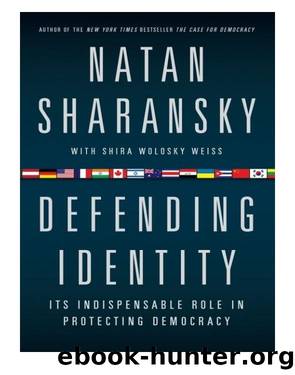Defending Identity by Sharansky Natan

Author:Sharansky, Natan
Language: eng
Format: epub
Publisher: PublicAffairs
Published: 2011-02-28T00:00:00+00:00
IDENTITY STRENGTHENS DEMOCRACY
In the free world, different attitudes toward identity and democracy are reflected in different attitudes toward the crucial questions facing us today. The American model suggests how identity and democracy can be closely allied, in a structure of overlapping identities in which a deep shared commitment to individual rights creates mutual respect. It is different in Europe. Whether the approach has been multicultural, as in Britain and the Netherlands, or assimilationist, as in France, or largely exclusionary, as in Germany, the attitude remains one in which democracy and identity, far from confirming one another, are seen as contradictory impulses. The zero-sum European model, where identityâs gain is democracyâs loss, remains true today. Unfortunately, European ideas of democracy have left no room for strong identities, and certainly not for different identities each expressing and affirming their own ways of life.
Like a rich mosaic of bright hues that slowly fades into one drab color, European countries, which have done so much to enrich the world with their unique cultures and traditions, are becoming a shell of their former selves in the name of abstract democracy. Europeâs loss is no oneâs gain. In abandoning their traditions and past, the people of Europe will be cut off from the very things that imbue life with purpose and meaning.
But even if Europeans do not place great value in maintaining the particular, Europeâs zero-sum view of identity and democracy poses an even more basic question. Can a democratic society that does not make room for identity, let alone nurture strong identities among its citizens, long survive?
Nationalismâthe diabolic impulse according to post-identity theoriesâhas been a powerful weapon in defending the free world against aggression. Roosevelt, Churchill, and De Gaulle in extremis gave their peoples hope and strength by appealing to history, tradition, and national values. They each drew on their nationsâ unique past to help secure its future. De Gaulle, as the voice of a free France, declared: âOur only aim, our only interest, is to remain to the end Frenchmen, worthy of France.â Churchill reminded his countrymen that beyond âall parties, all creeds, all classes . . . there is one bond which unites us all and sustains us in the public regard, namely that we are prepared to proceed to all extremities, to endure them and to enforce them; that is our bond of union in His Majestyâs Government.â And in his third inaugural address, nearly a year before Pearl Harbor, FDR, citing George Washingtonâs First Inaugural address, was already appealing to Americaâs past to mobilize the national will for the battle that he knew lay ahead:The destiny of America was proclaimed in the world of prophecy spoken by our first president in his First Inaugural of 1789: âthe preservation of the sacred fire of liberty and the destiny of the republican model of government are justly considered.â If you and I in this later day lose that sacred fireâif we let it be smothered with doubt and fearâthen we shall reject the destiny which Washington strove so valiantly and so triumphantly to establish.
Download
This site does not store any files on its server. We only index and link to content provided by other sites. Please contact the content providers to delete copyright contents if any and email us, we'll remove relevant links or contents immediately.
| Africa | Americas |
| Arctic & Antarctica | Asia |
| Australia & Oceania | Europe |
| Middle East | Russia |
| United States | World |
| Ancient Civilizations | Military |
| Historical Study & Educational Resources |
The Battle of Mogadishu by Matt Eversmann & Dan Schilling(737)
The Confidence Men by Margalit Fox(699)
The Spymaster of Baghdad by Margaret Coker(661)
A History of the Muslim World since 1260: The Making of a Global Community by Vernon O. Egger(659)
Jack the Ripper and the East End by Peter Ackroyd(630)
Empire of Fear: Inside the Islamic State by Andrew Hosken(608)
The Afghanistan File by Prince Turki AlFaisal Al Saud(605)
The Crimean War by Winfried Baumgart(597)
Islam At The Gates: How Christendom Defeated the Ottoman Turks by Diane Moczar(595)
Akhenaten by Dominic Montserrat(590)
The Jerusalem Diamond by Noah Gordon(588)
Beirut 2020 by Charif Majdalani(580)
A Concise History of Greece (Cambridge Concise Histories) by Richard Clogg(572)
The History of Jihad by Robert Spencer(571)
Enemy in the East by Rolf-Dieter Müller(548)
The Privatization of Israeli Security by Shir Hever(547)
Israel: Ancient Kingdom or Late Invention? by Daniel I. Block(546)
Destroying a Nation: The Civil War in Syria by Nikolaos van Dam(538)
The Nine Lives of Pakistan by Declan WALSH(537)
